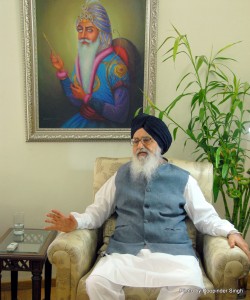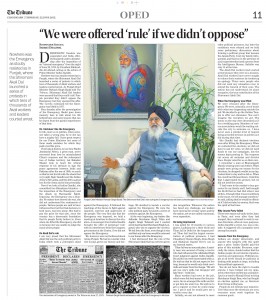Roopinder Singh & Sarbjit Dhaliwal
Democratic freedom was suspended and India effectively placed under a dictatorship after the imposition of an “internal emergency” from the night of June 25, 1975, by President Fakhruddin Ali Ahmed, acting on the advice of Prime Minister Indira Gandhi.
Nowhere was it as stoutly resisted as in Punjab, where the Shiromani Akali Dal launched a series of protests in which tens of thousands of Akali workers and leaders courted arrest. As Punjab Chief Minister Parkash Singh Badal told The Tribune, Shiromani Akali Dal leaders were assured that they could ‘rule’ Punjab provided they didn’t oppose the Emergency, but they spurned the offer. The morcha continued till the Emergency was lifted in 1977.
Four decades after the promulgation of the Emergency, Badal goes down memory lane to talk about his life behind bars and some lessons that can be drawn from the painful experiences of that time.

Punjab Chief Minister Parkash Singh Badal: The Shiromani Akali Dal’s role during the Emergency has not been acknowledged PHOTO © ROOPINDER SINGH
On ‘mistakes’ like the Emergency
In life, more so in politics, when someone takes a wrong step, he or she can have a mighty fall. I have great respect for our Prime Ministers but some of them made mistakes for which they paid a terrible price.
If we look at history, we see how Pandit Jawaharlal Nehru, a great man, never recovered from how he miscalculated China’s response and the subsequent loss of Indian territory. Lal Bahadur Shastri took to heart the critical response to his decision to sign the peace agreement between India and Pakistan after the war of 1965, so much so that he lost his life with the shock that very night. Rajiv Gandhi sent the Indian Army to Sri Lanka, and this led to a great loss for the Army and to him personally.
Now if we look at Indira Gandhi, she committed two Himalayan blunders — the imposition of the Emergency and the attack on Harmandar Sahib. Imposing the Emergency was a blunder. No matter how shrewd she was, she did not understand the sentiments of people. Various people are said to have influenced her, but the final decision, in both cases, was hers alone. She had to pay the price for that also, since the country has a democratic foundation that its people firmly believe in. Even when she lifted the Emergency, she did so because she was unable to judge the mood of the people.
On Akali Dal’s role
I am very proud that the Shiromani Akali Dal was the only political party in India which took a principled stand against the Emergency. It followed the teachings of the Gurus to fight against injustice, coercion and oppression of the people. The very first day that the Emergency was imposed, we held a meeting at Amritsar to discuss the situation. A messenger from Indira Gandhi brought the offer of perpetual ‘rule’ with no interference from the Congress government at the Centre, if we did not oppose the Emergency.
We, however, were not bothered about ruling Punjab. We had to consider what role to play, given our history and heritage. We decided to launch a morcha against the Emergency. We were the only political party to launch a series of protests against the Emergency.
At the very beginning, top leaders like Jathedar Gurcharan Singh Tohra and Jagdev Singh Talwandi and I courted arrest (barring Sant Harchand Singh Longowal, who was to organise the morcha). We led from the front, even though it was said that only our bones would be returned to our homes after the Emergency.
I feel distressed that the role of the Shiromani Akali Dal has not been given due recognition. Whenever the nation has faced any challenge, our leaders have stood up for secular values and for the nation, yet we are called communal, even separatists.
On being imprisoned
I was jailed for 19 months in various places, Ludhiana for a little while and Tihar Jail in Delhi for the longest period. Tihar Jail had the largest concentration of political prisoners. I had Chaudhary Charan Singh, Atma Singh and Maharani Gayatri Devi’s son as my barrack mates.
Tihar Jail was an unusual place. A saintly man was accused of being a tantric who had influenced the Allahabad High Court judgment against Indira Gandhi. He and his son were incarcerated with us. He told me that he did not expect to live long, because he would only drink cow’s milk and water from the Ganga. “We will get you cow’s milk, but Gangajal will take time,” I told him.
Many warders had cows in the jail, which were fed food meant for the prisoners. So we arranged the milk and later got him his water too. He told me to get a register so that he could repay me. I got it and he would give me a nuskha every day.
Initially, we are not allowed to meet other political prisoners, but later the conditions were relaxed and we held some preliminary discussions about forming a political group that became the Janata Party. I met my family infrequently, and that too in the presence of a jail superintendent and a person from the Intelligence Bureau. Sukhbir was only 14 at the time.
The Akali Dal workers had courted arrest because they were on a mission. Akali Dal workers have never sought to reduce their sentence by tendering an apology. There were people who did not seek any relaxation even to attend the funeral of their sons. The nation has not understood, let alone recognise, the true contribution of the Shiromani Akali Dal.
When the Emergency was lifted
We were released after the Emergency. We were, naturally, out of touch with what was happening outside the jail. We decided to go the Golden Temple to offer our obeisance. You can’t imagine the reception we got. The towns on the way were decorated as if for a wedding party. Members of various associations would be waiting outside the city to welcome us. I have never seen a similar level of respect being accorded to those in politics as I did during that time.
Mrs Gandhi had declared elections soon after lifting the Emergency. When we contested the elections, we did not have to ask for votes, we did not need funds to run our campaigns, but the money kept pouring in. The response cut across all sectarian and divisive lines. People voted for us on their own.
I remember a man at Bhawanigarh Mandi, wearing worn-out clothes. When people were giving me money for the elections, he dropped a wallet in my lap. I asked him to stay and he did so. When the crowd had thinned down, I told him that I appreciated his gesture, but we did not need the money.
“I had come to the market to buy groceries for my family and I had brought the Rs 80 that we had. But when I saw all this, I thought that I must contribute to the cause, we will manage somehow,” he said, adding that he would be offended if I did not take his money. Such was the spirit at that time.
Why Janata Party failed
There were many sub-units in the Janata Party, and even after they had merged, they continued to work in various directions, often at cross-purposes. Indira Gandhi’s arrest, too, was a mistake. It triggered off a sympathy wave among the people.
Lessons from the Emergency
Indians are deeply democratic, and anyone who tampers with this spirit pays a price. Indira Gandhi paid the price of this mistake. Everyone, especially the rulers, should realise that the Indian people do not tolerate injustice, coercion and oppression. Political people at all levels should be judicious in dealing with people at large, including their political opponents.
You do not have the right to trouble anyone. I have helped out my opponents when they needed my assistance. I put in a word to Morarji Desai to bring Harcharan Singh Brar, who had fought an election against me, as Governor from Orissa to Haryana.
People do not tolerate any injustice. I feel that once the elections are over, everyone must work together for common goals.
This article was published in The Tribune on June 25, 2015

